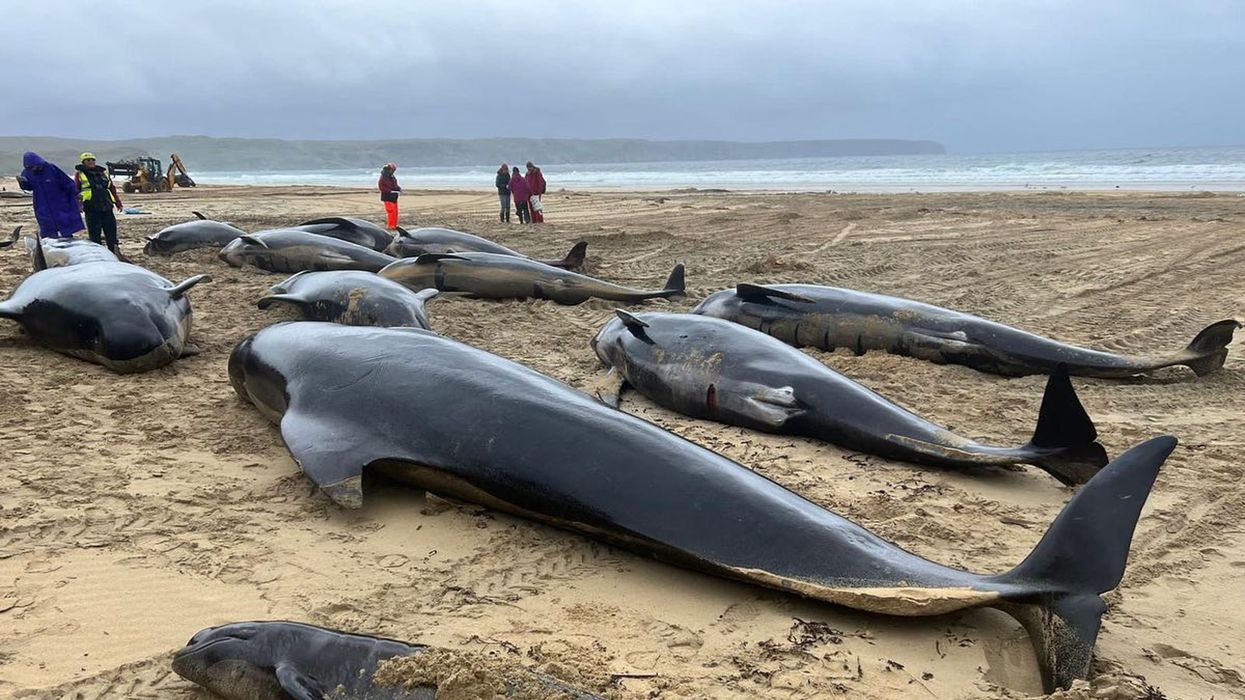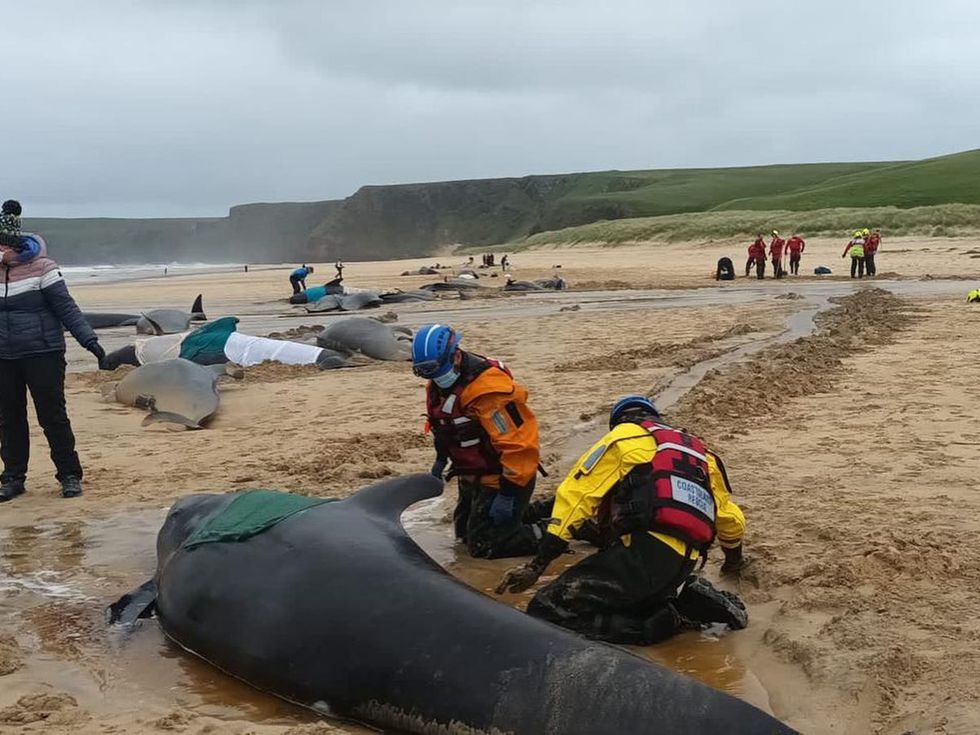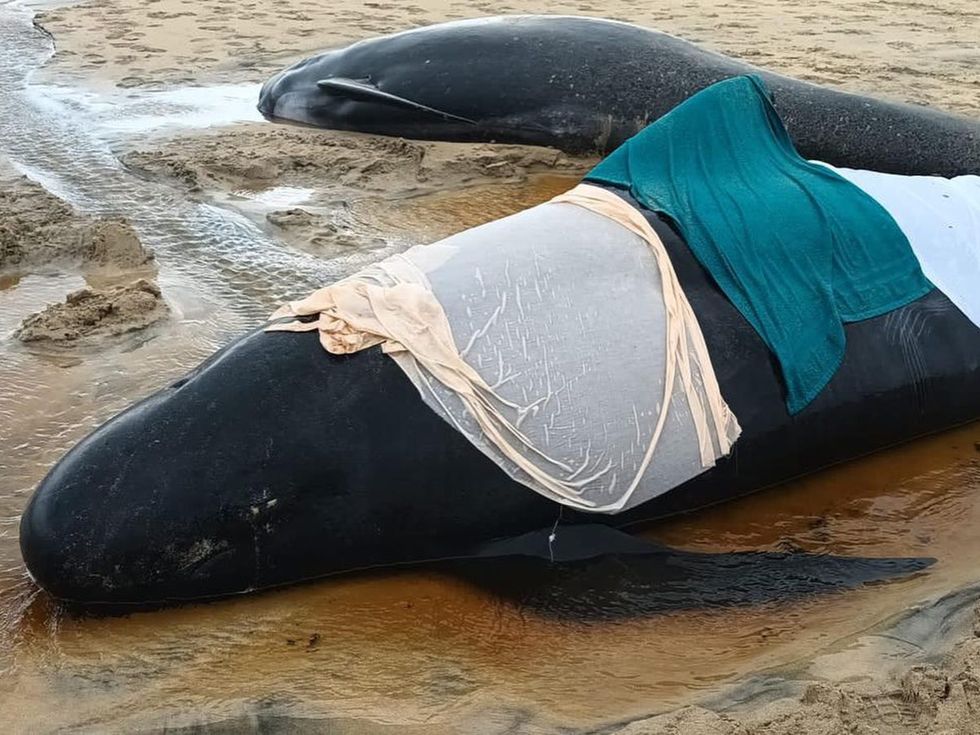
A pod of 55 whales has died in the worst mass stranding in Britain on a beach in the Scottish islands.
The whales washed on to Traigh Mhor beach at North Tolsta on the Isle of Lewis on Sunday morning.
Only 15 were initially alive, according to the British Divers Marine Life Rescue, a marine charity but were euthanised on welfare grounds after attempts were made to refloat two of the more active whales.
Experts are now facing a "race against time" to carry out post-mortems on the 55 mammals.

Pilot whales are small whales that are part of the dolphin family and are prominent to mass stranding - however the reason is not always clear.
They are known for their strong social bonds, so often when one whale gets into difficulty and strands, the rest follow.
A statement said: “At about 15:30, the local vet along with the Coastguard, Fire and Rescue, and a forensics vet came to the conclusion that the shallow beach and rough wave conditions made it too unsafe to refloat the remaining animals.
“Considering how long the pilot whales had been out of the water in addition to the poor conditions, it was decided that they should be euthanised on welfare grounds.”
Veterinary pathologist Dr Andrew Brownlow said the investigation into the stranding would be a "monumental task".
The Scottish Marine Animal Stranding Scheme (SMASS), will now carry out the post-mortem examinations.
"It's going to be a monumental task," Brownlow told the BBC.
"There are more animals sadly which are awaiting necropsy now than all of the mass strandings put together for the last decade.

"What we will try and do is triage these animals - we will select those animals that we think best represent the rest of the pod and make sure that we take samples and as much data that we can.
"Then it's simply a race against time, energy and weather. We will do the most that we possibly can to find out what's been going on here."
In 2011, between 60-70 whales came into shallow waters in Sutherland, while 21 died during a stranding at Pittenweem in 2012.
Brownlow said there are a number of reasons behind strandings and his team will be looking to rule out human impact.
from GB News https://ift.tt/snBjKCy

A pod of 55 whales has died in the worst mass stranding in Britain on a beach in the Scottish islands.
The whales washed on to Traigh Mhor beach at North Tolsta on the Isle of Lewis on Sunday morning.
Only 15 were initially alive, according to the British Divers Marine Life Rescue, a marine charity but were euthanised on welfare grounds after attempts were made to refloat two of the more active whales.
Experts are now facing a "race against time" to carry out post-mortems on the 55 mammals.

Pilot whales are small whales that are part of the dolphin family and are prominent to mass stranding - however the reason is not always clear.
They are known for their strong social bonds, so often when one whale gets into difficulty and strands, the rest follow.
A statement said: “At about 15:30, the local vet along with the Coastguard, Fire and Rescue, and a forensics vet came to the conclusion that the shallow beach and rough wave conditions made it too unsafe to refloat the remaining animals.
“Considering how long the pilot whales had been out of the water in addition to the poor conditions, it was decided that they should be euthanised on welfare grounds.”
Veterinary pathologist Dr Andrew Brownlow said the investigation into the stranding would be a "monumental task".
The Scottish Marine Animal Stranding Scheme (SMASS), will now carry out the post-mortem examinations.
"It's going to be a monumental task," Brownlow told the BBC.
"There are more animals sadly which are awaiting necropsy now than all of the mass strandings put together for the last decade.

"What we will try and do is triage these animals - we will select those animals that we think best represent the rest of the pod and make sure that we take samples and as much data that we can.
"Then it's simply a race against time, energy and weather. We will do the most that we possibly can to find out what's been going on here."
In 2011, between 60-70 whales came into shallow waters in Sutherland, while 21 died during a stranding at Pittenweem in 2012.
Brownlow said there are a number of reasons behind strandings and his team will be looking to rule out human impact.



0 Comments
Don't share any link